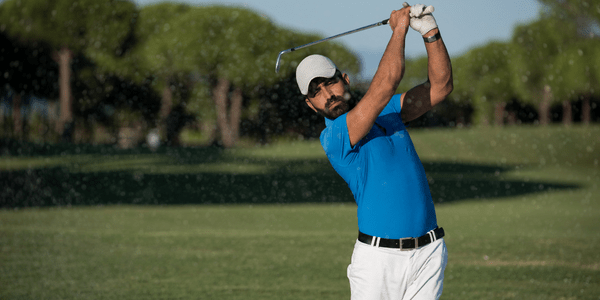
How often do you play a round with your ‘A’ game when al phases of your game are working?
All golfers hope to have their ‘A’ game every time they step to the first tee box.
Nothing is better than when every part of your game clicks as you move from hole to hole. Even after a stray shot, you feel confident in your ability to recover.
But what happens when you are having an off day? Maybe you are having difficulty missing short putts or hitting solid wedges.
How do you respond under these circumstances? Do you still battle? Do you have belief you can score with your ‘B’ game?
‘A’ Game or Bust Mentality
Many golfers battle with the belief that they cannot play well unless they have the ‘A’ game.
The belief sets the scene at the start of every round, which can start in the warm up when you’re not hitting solid shots…
However, if you play the first few holes well, you believe you will shoot a low score. But a bad start to the round can lead to the idea that “it’s one of those days.”
This either-or mentality interferes with your ability to compete, recover and find a way to shoot a low score.
In our Golf Mental Game Survey, a collegiate golfer asked: “How can I focus better when I’m not playing with my ‘A’ game?”
The first step is that you need to believe you can score well with your ‘B’ game. When you know you have a chance to win or pull out a good round, you will not become emotionally rattled when you make a bad shot.
Patience is the next critical component to play well with your ‘B’ game. Patience allows you to play in the present. Playing your best with your “B’ game is similar to playing chess.
It’s thinking about your next move. In other words, “what’s my best approach given these circumstances?
Let’s face it… Golfers are rarely playing in the zone. Success results from adaptability, staying calm and focusing on the moment…
When Vanderbilt’s Gordon Sargent won the 2022 NCAA Individual Men’s Golf Championship, he became the ninth freshman to earn the title.
Sargent admitted he didn’t have his ‘A’ game, but in the final round, he played his best when it mattered most. Sargent’s ‘B’ game kept his contention. Then, on the first playoff hole, Sargent carded his first birdie to win.
SARGENT: “Feel like I did a pretty good job of staying patient. Didn’t play my best but hung in there. Missed it in the right spots and was able to make some big par saves.”
Patience is the key to playing your best with your ‘B’ game. When you are patient, it is easier to find the next best move to take.
Even though you may not have your ‘A’ golf game, you should always maintain your ‘A’ mental game.
You want to think about how to score and manage your game rather than get rattled about poor ball striking.
In this case, course management is critical to staying in the tournament.
Golfer’s Mental Edge 2.0

Do you suffer from fragile self-confidence after missed hitting shots or making mistakes, playing with strict or high expectations that undermine confidence, or the inability to play freely and relaxed on the course?
If you lack focus, have low self-confidence or other mental game obstacles on the course, you cant reach your true golf potential…
Successful golfers have learned how to perform with ultimate confidence in competition, so we’ve developed The Golfer’s Mental Edge 2.0 Workbook and Audio program to help you do this!
The Golfer’s Mental Edge 2.0 program includes the top 11 mental training sessions I do with my personal students to help them boost their mental game and improve consistency on the course.
The Golfer’s Mental Edge 2.0 audio program includes 11 confidence-boosting CDs, MP3 audio recordings, and an 8-session golfer’s mental edge workbook–plus several bonus programs. Available Now!
Related Articles
- Playing Golf One Shot at a Time
- Your Expectation Affects Your Golf Game
- How Short-term Goals Helps You Focus
- Subscribe to The Golf Psychology Podcast on iTunes
- Subscribe to The Golf Psychology Podcast on Spotify